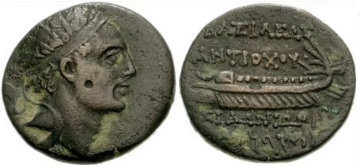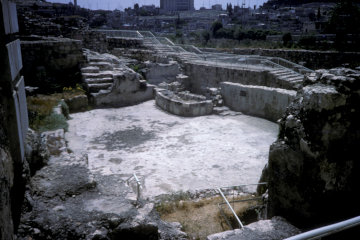The Looted Coin
Israeli officials recently raided the home of a suspected antiquities thief - and came up with gold.
Well, bronze actually. The man claimed to be interested in geology and in finding quartz crystals, but admits that he found and kept ancient objects while doing so. As the site near Kiryat Shmona is a protected archaeological area and is not noted for its quartz deposits, there is a degree of official scepticism about the man's story! Among the objects found in his home were arrowheads, rings, buttons and what may be lead sling stones.

| |
| A coin of Antiochus IV similar to the one found in Israel. |
The prize object, however, was a coin issued between 169 and 164 BC by the Seleucid king Antiochus IV Epiphanes to commemorate his victories in Egypt. Either Antiochus was attempting to put "spin" on a rather embarrassing incident or the coin was issued early in 169 BC when he was indeed being victorious in Egypt.
Antiochus' father, also called Antiochus, had taken Palestine from the Ptolemies of Egypt and when Antiochus IV usurped the throne from its rightful ruler - who was only a child and was a hostage in Rome at the time - the advisers to Ptolemy VI suggested that presumed chaos in Syria gave Egypt the perfect opportunity to reclaim its lost possessions. Unfortunately their information was incorrect - Syria wasn't in chaos and Antiochus had established firm control of the state - and their security was insufficient - Antiochus got word of their intentions and had his army waiting outside the city of Pelusium, the eastern-most city in the Nile Delta.
The resulting battle in 173 that took place as the Egyptians emerged from what they imagined to be a secure base, was a resounding victory for Antiochus. He not only captured Pelusium, but ranged far and wide over Egypt, taking the Egyptian king captive and conquering all but Alexandria, the Ptolemaic capital. The Ptolemies were in alliance with Rome, but the Romans were distracted by the Third Macedonian War and Antiochus took care to give his victory suitable "spin". Ptolemy was established in Memphis as a puppet king and Antiochus could claim that he had merely removed unsuitable advisers.
Unfortunately for him the people of Alexandria elected another Ptolemy as king. Even more unfortunately, the two royal Ptolemies very sensibly agreed not to fight a civil war - as no doubt Antiochus had hoped - but to act as joint rulers over Egypt. This provoked Antiochus into mounting a second invasion in 169 BC, when once again he swept all before him.
Just before he reached Alexandria, however, he was confronted by a single, elderly Roman senator, Gaius Popillius Laenas, who handed him a written copy of the Senate's decree that he leave Egypt and restore Cyprus to it. Antiochus, who was only four miles from his goal, attempted to prevaricate by saying that he had to consult with his council, but Gaius was having none of it. He was carrying a vine rod, the traditional mark of office of a centurion, and with it he drew a circle in the sand around Antiochus.
"Before you step out of that circle give me a reply to lay before the senate," Gaius demanded and Antiochus, who was aware of Roman strength and of the fact that they had just defeated Perseus of Macedon, capitulated. He led his troops back to Syria and the Romans reorganised the Egyptian government.
Some have suggested that Antiochus was relieved to have an excuse for not laying siege to Alexandria, but that seems a ridiculous suggestion. He had the rest of Egypt in his power, he had come with the express intention of capturing the city, he was only four miles from it when he was turned back. Not only do that ancient sources uniformly depict the encounter with Gaius as a shameful defeat for Antiochus, but if he had been looking for an excuse to avoid an expensive siege, he would nonetheless have kept Cyprus, where his army had been successful!
Some have interpreted the prophecy of Daniel chapter 8 as a reference to Antiochus IV, but the prophecy twice affirms that the "little horn" will be successful in all it does. This is hardly an accurate description of the reign of Antiochus IV Epiphanes (God manifest), whose own courtiers dubbed him "Epimanes" (the Lunatic)!
With his nose thoroughly out of joint, Antiochus marched back through Palestine where he was greeted with the news that Menelaus, his nominee for the office of high priest in Jerusalem had been expelled and a man called Jason had taken the office. Antiochus reacted with fury, not only taking Jerusalem but subjecting it to the traditional three days of pillage allowed when a city is captured by force. According to 2 Maccabees, 40,000 men, women and children were killed, many while hiding in their own homes, and another 40,000 were sold into slavery.

| |
| The cistern of the Accra fortress established in the heart of Jerusalem by Antiochus IV |
Antiochus then set about systematically demolishing the Jewish state and Jewishness. He sacrificed a pig on the altar of the Jerusalem temple and rededicated it to the Greek god Zeus. He forbade all aspects of the Jewish religion, including a ban on the circumcision of babies. Commissioners were sent out to force every Jew to sacrifice to the Greek gods, but when they reached the town of Modin, a few miles west of Jerusalem, the local priest, backed by his doughty sons, took up arms, killed the commissioner and started a revolt.
After some minor successes by the Maccabees, the cany Greeks avoided battle until the Sabbath, then attacked the Jewish camp. Rather than break the Sabbath, the Jews allowed themselves to be massacred, but after a second such disaster they put their heads together and gave themselves a dispensation to fight on the Sabbath if attacked. This is probably what Jesus had in mind when He asked His opponents whether it was "lawful to save life or to kill on the Sabbath?" The Maccabean decision meant that it was indeed lawful to kill in order to save your own life, so Jesus implied that it was even better to save life on the Sabbath without killing!
Antiochus was distracted by trouble in Persia, where the Parthians were attempting to regain control of eastern Persia and what is now Afghanistan. Although initially successful in battle, Antiochus was short of money and raided a temple of the god Nanaya to restore his finances. Shortly thereafter he fell ill and died, with both Jews and Parthians claiming that their god had punished the king for desecration.
Meanwhile the Syrian general Lysias was defeated by the Maccabees in three battles and the independent Hasmonean kingdom was set up. Again, hardly the all-conquering, universally successful "little horn". I think we must look elsewhere for the fulfilment of that symbol!
© Kendall K. Down 2022





